The annual Tata Consultancy Services-EducationWorld Teachers Awards 2009 attracted 5,000 nominations from primary and secondary school teachers countrywide. Eight innovative teachers with extraordinary achievements were felicitated and celebrated in Ahmedabad on November 6. Summiya Yasmeen reports
.gif)
It was a near thing. the staging of the Tata Consultancy Services-EducationWorld Teachers Awards 2009 — the fifth edition of India’s most prestigious and eagerly anticipated awards for primary and secondary school teachers — almost didn’t happen. On November 5, on the eve of the awards function, The Courtyard by Marriott, Ahmedabad’s newest five-star hotel, was denied ‘building use’ permission by the Ahmedabad Urban Development Authority.
Fortunately this last minute crisis didn’t sabotage the much awaited TCS-EW annual teachers awards celebration instituted in 2005 by Tata Consultancy Services, India’s IT (information technology) software and consultancy services industry leader, to select and reward the country’s most innovative K-12 school teachers. The company’s corporate events division headed by former India test cricket star Yajuvendra Singh swung into action and within 12 hours a new venue — The Cambay Grand, a recently inaugurated five-star luxury hotel in the city centre — was finalised. And all guests — including the 100 teachers from schools across Ahmedabad registered to attend — were contacted and advised about the change of venue.
Consequently despite this last minute glitch, the awards ceremony preceded by a four-hour workshop on carbon footprinting for the assembled teachers including the eight finalists of the TCS-EW Teachers Awards, went off smoothly on November 6. Eight primary and secondary school teachers short listed from 5,000 nominees/applicants from across the country were invited (all-expenses paid) for the final round of interview in Ahmedabad (pop. 3.5 million), the commercial capital of the western sea-board state of Gujarat (pop.50 million).
“Ahmedabad was chosen as the venue of the awards this year to reach out to and encourage teachers in second tier cities and surrounding areas to attend, learn, upgrade and improve teaching-learning practices. For similar reasons last year this event was staged in Lucknow,” explained Yajuvendra Singh an alumnus of Rajkumar College, Rajkot and Pune University who played seven test matches for India (and holds the record for the most catches in a test match) prior to signing up with TCS in 2004.
In Ahmedabad the eight short-listed teachers were interviewed by a three-judges panel comprising Anita Rajan, a former teacher and coordinator of the TCS-EW Teachers Awards; Neena Paul, assistant vice-president, IL&FS-ETS and Dilip Thakore, publisher-editor of EducationWorld.
Harminder Kaur Suri, junior school science teacher, Kendriya Vidyalaya 1, Ambala, and Dr. Faiqa Saulat Khan, head of the social sciences department at St. Joseph’s Convent, Bhopal were adjudged the country’s most innovative primary and secondary school teachers. Jayanti Ravi, commis-sioner of higher education in the Gujarat state government, presided as chief guest and presented trophies and awards to the winners and finalists.
Instituted in 2005 by the Mumbai-based Tata Consultancy Services (revenue: Rs.28,000 crore in fiscal 2008-09), India’s largest IT services company with 140,000 employees in 42 countries worldwide, and EducationWorld, India’s pioneer education news and analysis magazine (estb. 1999), the annual TCS-EW Awards encourage and inspire teachers to innovate new practices and pedagogies, and to make learning more joyful to improve childrens’ learning outcomes.
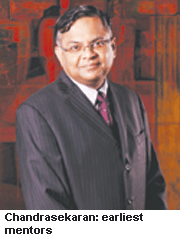 “Teachers are the earliest mentors in our lives and committed teachers can make all the difference between the exciting and routine, fun and tedious, and inspiration and instruction. The annual TCS-EW Teachers Awards is our contribution to celebrating teachers who have gone beyond textbooks to teach and inspire,” said N. Chandrasekaran, the newly appointed Mumbai-based chief executive and managing director of the globe-girdling TCS, in a special message sent to the convocation, which he was unable to attend due to unforeseen business reasons. An alumnus of the Regional Engineering College, Trichy, in his 22-year stint with TCS, Chandrasekaran held several positions including that of executive director and chief operating officer, before succeeding the erudite and inspirational S. Ramadorai as chief executive on October 6.
“Teachers are the earliest mentors in our lives and committed teachers can make all the difference between the exciting and routine, fun and tedious, and inspiration and instruction. The annual TCS-EW Teachers Awards is our contribution to celebrating teachers who have gone beyond textbooks to teach and inspire,” said N. Chandrasekaran, the newly appointed Mumbai-based chief executive and managing director of the globe-girdling TCS, in a special message sent to the convocation, which he was unable to attend due to unforeseen business reasons. An alumnus of the Regional Engineering College, Trichy, in his 22-year stint with TCS, Chandrasekaran held several positions including that of executive director and chief operating officer, before succeeding the erudite and inspirational S. Ramadorai as chief executive on October 6.
At the well-coordinated and glittering awards ceremony, seven finalists — the eighth T. Venkatesh Kumar was absent due to ill-health — were showered with cash awards, certificates and mem-entos. Best teachers Harminder Suri (primary) and Faiqa Saulat Khan (secondary) were presented state-of-the-art laptop computers in addition to cheques of Rs.10,000 each. All six finalists also received cheques of Rs.10,000 with three of them — N.A. Bollamma, Kaveri Chatterjee and Nirmal Singh — who were specially comm-ended by the judges — awarded additional cheques for Rs.5,000 each by EducationWorld. Moreover, all finalists received specially commissioned TCS-EW silver and acrylic embossed trophies.
The process of selecting India’s most innovative school teachers began in April this year with repeated advertising of the awards in EducationWorld, and a poster campaign in schools across the country. Principals, parents, school managements and students were invited to nominate innovative and/or exceptional primary and secondary teachers for the awards. The 5,000 nominations received were scruti-nised by a team led by Neena Paul, the Bangalore-based assistant vice-president of IL&FS Education and Technology Services Ltd (IETS), the 12-year-old education consultancy and training subsidiary of the Mumbai-based construction and infrastructure financing giant IL&FS. Following assessment of their detailed application/nomination forms, 200 teachers were requested to submit 300-500 word essays specifying their classroom innovations and best practices. Of the 200 essays solicited, 120 were received within the prescribed deadline.
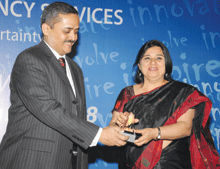 After careful evaluation of essays received from school teachers countrywide, eight were invited for personal interview in Ahmedabad. “In the overwhelming majority of nominations received, I found there was hesitation and reluctance on the part of teachers to detail their innovations and creative best practices. My appeal to teachers is to not be too modest and to highlight their classroom innovations. I hope next year, nominated teachers will not be as hesitant to blow their own trumpets. It’s in the national interest that they do so,” said Neena Paul speaking on the occasion.
After careful evaluation of essays received from school teachers countrywide, eight were invited for personal interview in Ahmedabad. “In the overwhelming majority of nominations received, I found there was hesitation and reluctance on the part of teachers to detail their innovations and creative best practices. My appeal to teachers is to not be too modest and to highlight their classroom innovations. I hope next year, nominated teachers will not be as hesitant to blow their own trumpets. It’s in the national interest that they do so,” said Neena Paul speaking on the occasion.
Winners and finalists of the Tata Consultancy Services-EducationWorld Teachers Awards 2009 are profiled on the following pages.
Harminder Kaur Suri
Most innovative primary teacher
A science teacher of classes V-VII at Kendriya Vidyalaya no. 1, Ambala (Haryana), Harminder Kaur Suri was adjudged India’s most innovative primary school teacher by the jury of the TCS-EW Teachers Awards 2009. Suri’s persistent efforts to incorporate ICT (information communication technologies) in teaching the sciences (physics, chemistry and biology) to children aged nine-12 won her the verdict of the judges panel.
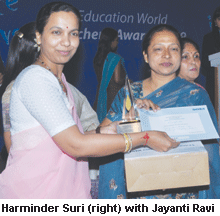 “Science subjects are best learned through practicals. I encourage my pupils to research classroom lessons on the internet and use popular computer software programmes to create animations, picture lessons, mind maps, powerpoint presentations, etc. ICT has revolutionised Indian education, especially science teaching as it makes concepts come alive, and children enjoy learning by seeing and experiencing, rather than cramming mindlessly. I’m happy that the TCS-EW Awards jury acknowledged my value addition efforts in creating a love for science in children at an early age,” says Suri.
“Science subjects are best learned through practicals. I encourage my pupils to research classroom lessons on the internet and use popular computer software programmes to create animations, picture lessons, mind maps, powerpoint presentations, etc. ICT has revolutionised Indian education, especially science teaching as it makes concepts come alive, and children enjoy learning by seeing and experiencing, rather than cramming mindlessly. I’m happy that the TCS-EW Awards jury acknowledged my value addition efforts in creating a love for science in children at an early age,” says Suri.
A science and education graduate of Calcutta and Kurukshetra universities, Suri began her career in 1990 as a junior school teacher in a government-aided school in Ambala. In 1995 she signed up with Kendriya Vidyalaya No.1, Ambala. A constituent school of the Central-government promoted chain of 986 Kendriya Vidyalayas — commonly acknowledged as model government primary-secondaries — KV1, Ambala was one of the first KVs to be promoted way back in 1963. Currently it boasts an enrolment of 1,800 students tutored by 80 teachers, and is winner of the 5th Computer Literacy Award of the Union ministry of communications and information technology.
“I studied in a Kendriya Vidyalaya and it was my dream to teach in one. KVs are among the best schools countrywide in terms of infrastructure, computer laboratories and student learning outcomes. I consider myself fortunate to teach in this great institution,” says Suri who taught herself how to use the computer in the late 1990s when her school had just one personal computer. Subsequently as ICT became a buzzword in Indian education, Suri enrolled in formal ICT teacher training programmes conducted by multinationals Intel, Microsoft and Oracle.
In her presentation to the jury, Suri detailed how she enrolled her school on ThinkQuest, an online learning portal of the US-based Oracle Education Foundation for teachers and students worldwide to create learning projects, participate in competitions, and browse a library of student projects. In the Annual Global ThinkQuest Website Competition 2008-09, the school team led by her received a special mention for designing a website christened Flying Jewels. “The website content demonstrated how environmental pollution is causing the gradual extinction of butterflies, and the fatal consequences of this development for planet Earth,” says Suri.
Also the conferee of the Microsoft Innovative Teachers Leadership Award 2007; the India Education Awards of the Education Quality Foundation of India; and Special Mention Award for Best Teaching Practices of NIIT, Suri has some words of advice for her fellow teachers.
“Teachers need to venture beyond the classroom and textbooks, and access the wealth of additional information available on the internet to make learning an enjoyable experience for students. And most important, come out of your school gates and share your innovations and best practices with other teachers so that teaching-learning standards improve across the education system,” says Suri, who practices what she preaches by posting her innovations online.
Dr. Faiqa Saulat Khan
India’s best secondary teacher
In a photo-finish run-off Dr. Faiqa Saulat Khan of St. Joseph’s Convent Senior Secondary School, Bhopal, was adjudged the country’s best secondary school teacher at the TCS-EW Teachers Awards 2009. Dr. Khan who teaches history to classes IX-XII at the CBSE-affiliated St. Joseph’s Convent was commended for making the dull memory-based subject that is history interesting and enjoyable for students.
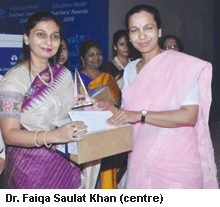 “I’m honoured that the jury has acknowledged my work in a subject which most parents tend to dismiss as peripheral. This award has reinforced my belief that the study of history is critical to developing responsible citizens confident of their identity and aware of their society, country and its place in the world,” says Khan, who also heads the social studies department at St. Joseph’s Convent, which has 4,200 students on its muster roll.
“I’m honoured that the jury has acknowledged my work in a subject which most parents tend to dismiss as peripheral. This award has reinforced my belief that the study of history is critical to developing responsible citizens confident of their identity and aware of their society, country and its place in the world,” says Khan, who also heads the social studies department at St. Joseph’s Convent, which has 4,200 students on its muster roll.
An arts graduate of Barkatullah University, Bhopal, Khan pressed on to pursue Master’s and Ph D degrees in history from her alma mater. Immediately after postgraduation in 1996, she was appointed history teacher for undergraduate students at the Government College of Excellence. But this assignment lasted for barely six months as she became aware that she is more effective teaching children rather than youth. In 1997 she accepted a long-standing invitation to teach history to secondary students in St. Joseph’s Convent.
In a well-delivered presentation, Khan impressed the three-judge panel by outlining how she employs innovative pedagogies combining visual images, videoclips and field trips with textbook content to enliven history lessons. “History is a much dreaded subject because of the many dates and numbers students have to remember. Moreover prescribed textbooks tend to be written indifferently. Therefore my strategy has been to make history interesting and enjoyable with the help of the internet and visual aids. For instance, for class X students I researched and prepared a power point presentation comprising visuals of major historical monuments across India. It infused life into the lengthy textbook chapter on the Heritage of India, and unsurprisingly five of my students scored 100 percent and a majority of them over 80 percent in last year’s board exams,” says Khan.
A firm believer in the virtues of experiential learning, Khan has also enriched her students’ history learning experience by organising field trips to historical sites, museums and libraries and introduced tree planting and lake-saving programmes. “Teachers need to inculcate a love for learning in their students. By employing creativity and new information technology options, all subjects including history can be made interesting. My plea to history teachers across the country is to make the effort to innovate, to make learning of this important subject fulfilling and rewarding,” says Khan, also an expert sharpshooter who was recently awarded a gold medal by the Bhopal Rifle Club.
The TCS-EW Award is not her first accolade. In 2007-08 she was awarded the Broad Outlook Learn Teacher’s Award sponsored by Air India and the Best Teacher Award of the school for the excellent performance of class X students in history in the CBSE examinations of 2007.
Uma Pradeep
Joyous learning proponent
A classes I-IV teacher of the CBSE-affiliated Indira National School, Pune, Uma Pradeep believes in learning by doing and activity-based teaching. In her 14-year career as a teacher she has introduced several novel supplementary activities including puzzles, songs, games, and skits to induct five-year-olds into learning. “Early in my teaching career, I realised that traditional chalk-n-talk teaching doesn’t work with small children. That’s when I started using puzzles, games, charts, songs, and clay models to teach them the English alphabet, numbers and names of vegetables and fruits. I noticed immediate results. They became curious to learn, involved and their retention improved dramatically,” recalls Pradeep, a primary education category national finalist.
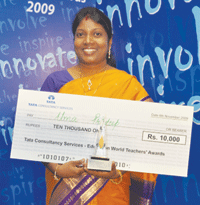 An arts and education graduate of Pune University, Pradeep began her career as a primary school teacher in the Maharashtra state board affiliated Good Samaritan School (1994-1999). This was followed by stints in the city’s NCL School (1999-2004) and Bharatiya Vidya Bhavan (2004-2007). In 2007 she accepted an offer from Indira National School to teach class I students and serve as co-ordinator of the primary school.
An arts and education graduate of Pune University, Pradeep began her career as a primary school teacher in the Maharashtra state board affiliated Good Samaritan School (1994-1999). This was followed by stints in the city’s NCL School (1999-2004) and Bharatiya Vidya Bhavan (2004-2007). In 2007 she accepted an offer from Indira National School to teach class I students and serve as co-ordinator of the primary school.
Self-motivated and goals-driven, Pradeep impressed the judges panel with her dedication to transforming classrooms into lively, energetic, and colourful learning spaces for pupils who learn by doing through joyous activities. “I believe that when children see they remember, and when they remember they learn. It’s important for teachers to create cheerful child-friendly classrooms in which children are encouraged to ask questions, share their experiences and discover themselves. This instills a love of learning from a young age,” says Pradeep.
Enthused by the camaraderie and encomiums she received during the recent TCS-EW teachers awards, Pradeep is converted to the cause of sharing her best teaching practices with teachers countrywide. “Interacting with teachers from across the country at the TCS-EW Teachers Awards has motivated me to not only upgrade and innovate, but also share my best teaching practices with others to help raise standards of Indian education,” vows Pradeep.
Nupur Ghosh
Wonderful voyager
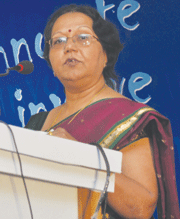 For Pune-based Nupur Ghosh her 23-year experience as a teacher has been a “wonderful voyage of self-discovery and exploration of new ways of helping children develop love of learning”. A psychology graduate of Calcutta University with a B.Ed degree from Pondicherry University, Ghosh began her career in 1984 as a primary school science teacher at the All Saints High School, Pune. Two years later in 1986 she resigned to follow her scientist husband to the US, where she taught in several pre-schools. On her return to India in 1991, she accepted an offer to teach at the Maharashtra state board affiliated Sindhu Vidya Bhavan, Pune. After 17 years at this school, 11 of which were as principal of the primary school, Ghosh resigned in June this year to take on “a new challenge” as principal of the state board affiliated Dyanganga High School (estb.1999), which has 2,500 students instructed by 110 teachers on its muster rolls.
For Pune-based Nupur Ghosh her 23-year experience as a teacher has been a “wonderful voyage of self-discovery and exploration of new ways of helping children develop love of learning”. A psychology graduate of Calcutta University with a B.Ed degree from Pondicherry University, Ghosh began her career in 1984 as a primary school science teacher at the All Saints High School, Pune. Two years later in 1986 she resigned to follow her scientist husband to the US, where she taught in several pre-schools. On her return to India in 1991, she accepted an offer to teach at the Maharashtra state board affiliated Sindhu Vidya Bhavan, Pune. After 17 years at this school, 11 of which were as principal of the primary school, Ghosh resigned in June this year to take on “a new challenge” as principal of the state board affiliated Dyanganga High School (estb.1999), which has 2,500 students instructed by 110 teachers on its muster rolls.
Throughout her rich and varied career, Ghosh has used creativity and imagination to design new learning-by-doing pedagogies. Among them: introducing the concept of “savings bank” to teach maths; encouraging students to plant a ‘Garden for Life’ to teach science and geography; and creating dedicated slots in school timetables for extra-curricular activities. “I am a strong believer in practical learning particularly for primary school students. In Sindhu Vidya Bhavan, with the help of students we planted a garden for life on the school campus to teach them about different varieties of soil, vegetables, global warming and environment conservation. They also learned about rain water harvesting and building vermiculture pits for waste and garbage disposal,” she explains.
Yet the capability which impressed the judges panel most was her wide world-view which prompted her to promote exchange of pedagogies and cultural traditions with schools in several countries. As principal of the state board affiliated Sindhu Vidya Bhavan she took the lead to enrol the school in British Council’s UKIERI (UK-India Education and Research Initiative) project which facilitates teacher and student exchan-ges between British and Indian schools.
In 2007 as part of this exchange programme Ghosh visited four public (i.e government) primary schools in Cornwall. “This was a transformative experience. All the four schools had state-of-the-art infrastructure such as computers, LCD projectors, science labs, musical instruments, aids in geog-raphy, maths, and offered vocational education programmes. Moreover their classroom environments were stress-free and encouraged teacher-pupil interaction. There’s much that Indian schools and teachers can learn from their British counterparts. First the govern-ment must spend more to equip its schools, and secondly teachers must move beyond chalk-n-talk to interactive teaching,” says Ghosh.
Nor is the TCS-EW Teachers Award trophy and certificate the first of her honours. In 2008 Ghosh received the Ideal Principal Award from the Aurangabad-based All India Citizens Development Centre, and in 2005 she was awarded the Best Teacher trophy by the Pune Zilla Parishad.
Kaveri Chatterjee
Multi-faceted teacher
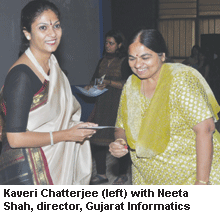 “A classroom environment free from fear and criticism facilitates children to enjoy the learning experience and discover their latent talents,” says Kaveri Chatterjee, who employs creativity and imagination to transform primary school English classes at Kolkata’s Haryana Vidya Mandir School into centres of joyful learning.
“A classroom environment free from fear and criticism facilitates children to enjoy the learning experience and discover their latent talents,” says Kaveri Chatterjee, who employs creativity and imagination to transform primary school English classes at Kolkata’s Haryana Vidya Mandir School into centres of joyful learning.
At the recently concluded TCS-EW Teachers Awards, Chatterjee received special commendation from the three-member jury and an additional cheque of Rs.5,000 from EducationWorld for using her fine arts training to liven up English language teaching in classes V-VII. “I liberally use visual aids — pictures, video clips, and slides — in my English grammar lessons, and also use figures and blocks to explain tenses and prepositions. Moreover in English literature classes we encourage dramatisation and role play by students, and discussions,” says Chatterjee. After taking a career break for 11 years to raise her two children, in 1993 she accepted the position of art-cum-English teacher at Haryana Vidya Mandir, Kolkata. Subsequently in 2003 she was promoted to coordinator and in May this year appointed principal of the junior school. A CBSE affiliated K-XII co-educational school, Haryana Vidya Mandir has an enrolment of 4,000 students instructed by 130 teachers.
Chatterjee is also actively involved with organising cultural events and coordinating other school activities. “Within the school I am a jack of all trades. I script and direct plays, serve as the emcee at school functions, judge art, extempore elocution and drama competitions,” says this effervescent and articulate teacher, who has also illustrated a story book for children.
A strong advocate of the power of art to help children de-stress in competitive academic environments, Chatterjee is wholly supportive of the school reforms initiated by Union human resource development minister Kapil Sibal. “The academic and evaluation reforms announced by Mr. Sibal are good. They will enable teachers to move away from quantitative to qualitative assessment and encourage students to reduce rote learning and cramming. However I want the new minister to implement these reforms not just in CBSE schools but in all schools countrywide. Children in government schools also deserve to learn in stress-free happy classrooms,” she says.
Bollamma N.A.
Hands-on biologist
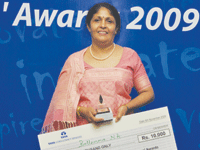 Vice-principal and a class ix-x biology teacher of the CISCE-affiliated Coorg Public School, Gonikoppal, Bollamma N.A. discharges her duties as an institutional leader and teacher with practised ease. For her exemplary administrative skills and teaching innovations, Bollamma received special commendation from the TCS-EW Teachers Awards jury and a additional cheque of Rs.5,000 from EducationWorld. “I am honoured that TCS and Education-World have recognised my work in a school situated in Coorg — a small hill district in Karnataka. This award has given me confidence that I’m on the right path,” says Bollamma.
Vice-principal and a class ix-x biology teacher of the CISCE-affiliated Coorg Public School, Gonikoppal, Bollamma N.A. discharges her duties as an institutional leader and teacher with practised ease. For her exemplary administrative skills and teaching innovations, Bollamma received special commendation from the TCS-EW Teachers Awards jury and a additional cheque of Rs.5,000 from EducationWorld. “I am honoured that TCS and Education-World have recognised my work in a school situated in Coorg — a small hill district in Karnataka. This award has given me confidence that I’m on the right path,” says Bollamma.
A biosciences postgraduate of Mysore University with a B.Ed from Annamalai University, Bollamma served as a teacher at the Cauvery College in her native Coorg and Bethany High School, Bangalore before signing up with the Coorg Public School (CPS), Gonikoppal in 1997, a year after its inauguration. “CPS was established to provide quality secondary education to children in Coorg and to save parents the trouble of sending them all the way to Bangalore. I’m happy to say that during the past 13 years we have established a high quality class I-X institution which offers academic and extra-curricular education on a par with top private schools in the metros,” says Bollamma who was promoted to the position of vice-principal in 2008. A fully residential co-ed school, CPS has 850 students instructed by 60 faculty on its muster rolls.
Apart from supervising curriculum planning, teacher training and other administrative tasks, Bollamma is a hands-on biology teacher. Passionate about her subject, she has effectively used the locational advantage of CPS in Gonikoppal — a scenic village in Coorg set in the Western Ghats bio-reserve boasting forests, rivers and waterfalls — to organise field trips and involve students in environment studies. “Nature is my lab. Thanks to the school’s location in one of the country’s most ecologically rich districts, I have every opportunity to take children trekking and on nature excursions to study exotic flora and fauna for themselves,” she says.
Also a captain of CPS’ scouts and guides, in 2007 Bollamma with a team of 15 students represented India at the 21st World Scout Jamboree held at Hylands Park, London, which attracted 40,000 students from 158 countries.
Nirmal Singh
State school savant
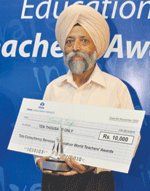 The only state government school teacher to be short-listed for the final round of the TCS-EW Teachers Awards 2009, Chandigarh-based Nirmal Singh won high praise and special commendation from the awards jury for devoting many hours beyond the call of duty for developing low-cost teaching aids. In a teaching career spanning 28 years, this high school (classes VIII-X) science and technology teacher of the Government Model High School, Chandigarh has developed teaching aids using locally available materials to demo and explain scientific concepts and principles to students. Among his list of inventions: a ‘wonder bank’, a wooden block hanging in air on cotton thread, water cycle, door bell projector, portable xeroradiograph, water softener and micro-algae biodiesel.
The only state government school teacher to be short-listed for the final round of the TCS-EW Teachers Awards 2009, Chandigarh-based Nirmal Singh won high praise and special commendation from the awards jury for devoting many hours beyond the call of duty for developing low-cost teaching aids. In a teaching career spanning 28 years, this high school (classes VIII-X) science and technology teacher of the Government Model High School, Chandigarh has developed teaching aids using locally available materials to demo and explain scientific concepts and principles to students. Among his list of inventions: a ‘wonder bank’, a wooden block hanging in air on cotton thread, water cycle, door bell projector, portable xeroradiograph, water softener and micro-algae biodiesel.
“I developed the wonder bank and wooden block to explain the scientific principles behind two commonly performed magic tricks. They were selected to be displayed at the Jawaharlal Nehru Science Exhibition held in Hyderabad in 2002. Other teaching aids such as water cycle, door bell projector and water softener were developed to explain scientific concepts such as reflection of light, magnetism and electrolysis. All these teaching aids were developed using low-cost materials such as discarded CDs, wooden blocks and aluminum sheets,” says Singh, a science graduate of Arya College, Ludhiana with an M.Sc in botany from Rajasthan University and Masters in education from Punjab University. After four years (1981-84) as science teacher at the private sector Guru Nanak Public School, Chandigarh, Singh was inducted into the Punjab state government’s teachers cadre.
According to Singh the Government Model High School is relatively well-equipped in terms of infrastructure, but learning motivation among the 1,000 plus students is low. “Most students are first generation learners from socio-economically disadvantaged families. Teachers have to be particularly innovative and develop activity-based programmes to stimulate student interest in learning. To teach science subjects — physics, chemistry, biology — mechanical textbook approaches don’t work. Hence I was obliged to develop supplementary learning aids. The outcome has been rewarding. For six consecutive years since 2003, our school has recorded 100 percent pass results in science subjects,” says Singh who as president of the school’s Himalayan Eco-club has mobilised students to maintain a herbal garden with 30 medicinal plants on the school campus, organised tree planting campaigns, and awareness programmes on solid waste management.
T. Venkatesh Kumar
Botany evangelist
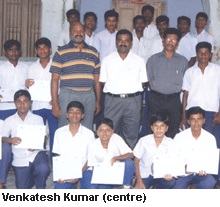 A class XI-XII botany teacher in the state board affiliated Victoria Memorial Government Higher Secondary School for Boys in Periyakulam, Theni district (Tamil Nadu), which has an aggregate enrolment of 1,300 boys instructed by 55 teachers, T. Venkatesh Kumar was a finalist of the TCS-EW Teachers Awards 2009. Apart from introducing innovations in the classroom and infusing enthusiasm for the study of botany in higher secondary students, Kumar is also a respected social, environmental and community welfare activist in Theni district.
A class XI-XII botany teacher in the state board affiliated Victoria Memorial Government Higher Secondary School for Boys in Periyakulam, Theni district (Tamil Nadu), which has an aggregate enrolment of 1,300 boys instructed by 55 teachers, T. Venkatesh Kumar was a finalist of the TCS-EW Teachers Awards 2009. Apart from introducing innovations in the classroom and infusing enthusiasm for the study of botany in higher secondary students, Kumar is also a respected social, environmental and community welfare activist in Theni district.
“I believe children should learn botany through discovery and exploration. Therefore I regularly organise field trips and nature walks in our district which is blessed with beautiful parks and rivers. Direct exposure to the environment prompts them to think about ways and means to eradicate pollution and prevent environment despoliation. I also use the computer and LCD projector to make botany interesting for students,” says Kumar, a botany postgraduate of Madras University with a Masters in education from Annamalai University. After serving as a teacher in a private school in Dharmapuri for two years, he joined VM Government Higher Secondary in 2002 where his pedagogy innovations have enabled his students to repeatedly scale new heights in the Tamil Nadu State Board examinations year after year.
Yet perhaps the greatest achievements of this socially committed teacher are in the field of community service. He has been instrumental in planting 3,000 trees in and around Devedanapatti government school in Theni district; installed a drinking water tank and 20 taps for poor children; persuaded philanthropists to donate school uniforms for children and has conducted free medical camps for the poor and several special hygiene camps for socio-economically disadvantaged children.
“I don’t regard teaching and engaging in community activities as work. These are pleasurable duties which have their own reward,” says Kumar who maintains a library with 3,000 books at his residence which is freely accessible to all students in Theni district.